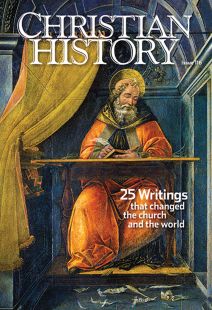Others we love, part 3
Order Christian History #116: Twenty-Five Writings that Changed the Church and the World in print.
Subscribe now to get future print issues in your mailbox (donation requested but not required).
Book of Martyrs
I was 14 when I discovered John Foxe’s Book of Martyrs (1563) in my grandparents’ basement. Sitting on a pile of old newspapers with a sump pump whirring, I devoured the pages. Both repulsed and fascinated, I could not lay it aside.
Before reading Foxe (1516–1587), I had some idea of cruelty. But to deliberately, systematically torment others because they were followers of Christ was beyond my comprehension.
Foxe’s original aim was to show that England was God’s chosen nation and that its sixteenth-century martyrs, executed by Henry VIII and Queen Mary, were part of a tradition that stretched back to the apostles. His 1,800-page book, originally titled Actes and Monuments, spread a vision of Protestant heroism that helped alienate British Protestants from Roman Catholicism. Although the book’s politics soon grew dated, its stories of heroic Christians are timeless; millions of Jesus followers around the world face such realities today. Demand never waned. Dozens of editions are still sold on Amazon. —Dan Graves
The Dark Night of the Soul
“In a real dark night of the soul it is always three o’clock in the morning,” said F. Scott Fitzgerald, but he wasn’t the first to use the phrase. It derived from Reformation-era Spanish mystic St. John of the Cross (1542–1591).
In his early twenties, John became a member of the Carmelite order of friars. Three years later he joined forces with Teresa of Ávila (1515–1582), a Carmelite nun who wished the order to return to its stricter and more primitive roots: silence, abstinence from meat, evangelization, and simple clothing—including no shoes. Their reform efforts led to confrontation with other Carmelites, and John was imprisoned in 1578. Around this time he composed The Dark Night of the Soul, which spoke of dying to all things to reach union with God: “These dense darknesses have deprived [the soul] of all satisfaction—love alone . . . makes her soar to God in an unknown way along the road of solitude.” Later Christians found the term described seeming absences of God in their own lives; I am one of them. It’s such a part of Western culture that fantasy writer Douglas Adams even parodied it in The Long Dark Tea-Time of the Soul.—Jennifer Woodruff Tait
Interior Castle
My appreciation for Teresa of Ávila was originally rooted in Robert Boyd Munger’s My Heart Christ’s Home (1951) and its interior journey through five rooms and a closet in the soul. Reading it as a college student, it struck me: Jesus said we’re all building the house of our lives on something (Matt. 7:24–29) and filling it with something (Matt. 12:25–30).
Later I discovered Teresa’s Interior Castle (1577). Four centuries before Munger, Teresa envisioned the human soul as a crystal globe resembling a castle. She wrote of seven successive mansion-courts of meeting our Lord in deeper prayer; the innermost room brought communion with Christ. Teresa’s life as reformer led her to become the first woman named a “Doctor of the Church.”
All along my movement from initially “inviting Jesus into my heart” to increasingly “turning over title and management” of the spaces and “rooms” in my castle have meant a disciple’s journey across life seasons.—James D. Smith III, professor and pastor
This article is from Christian History magazine #116 Twenty-Five Writings that Changed the Church and the World. Read it in context here!
By various
[Christian History originally published this article in Christian History Issue #116 in 2015]
Next articles
Solid, scriptural, rational
The Book of Common Prayer [#12] set forth a liturgy that lasted
Jennifer Woodruff TaitNot concerning the heart but the life
Jonathan Edwards’s Treatise [#23] and John Wesley’s Plain Account [#22] spoke of holiness
William Kostlevy




